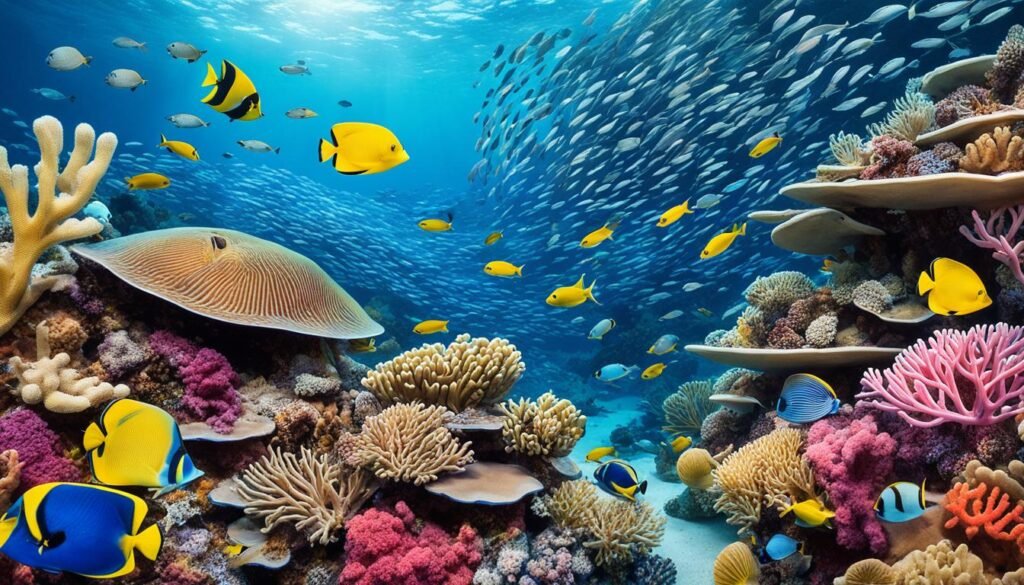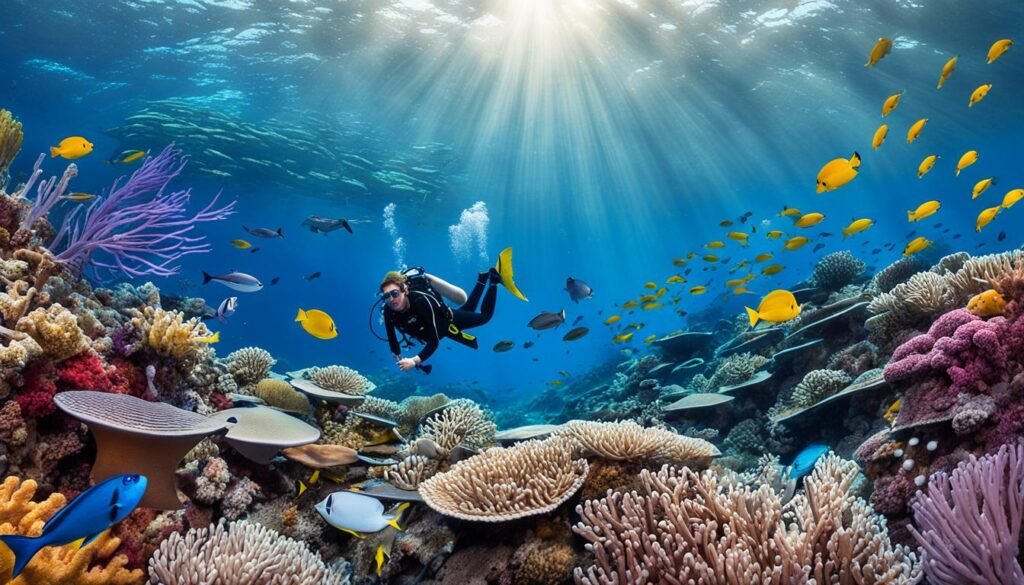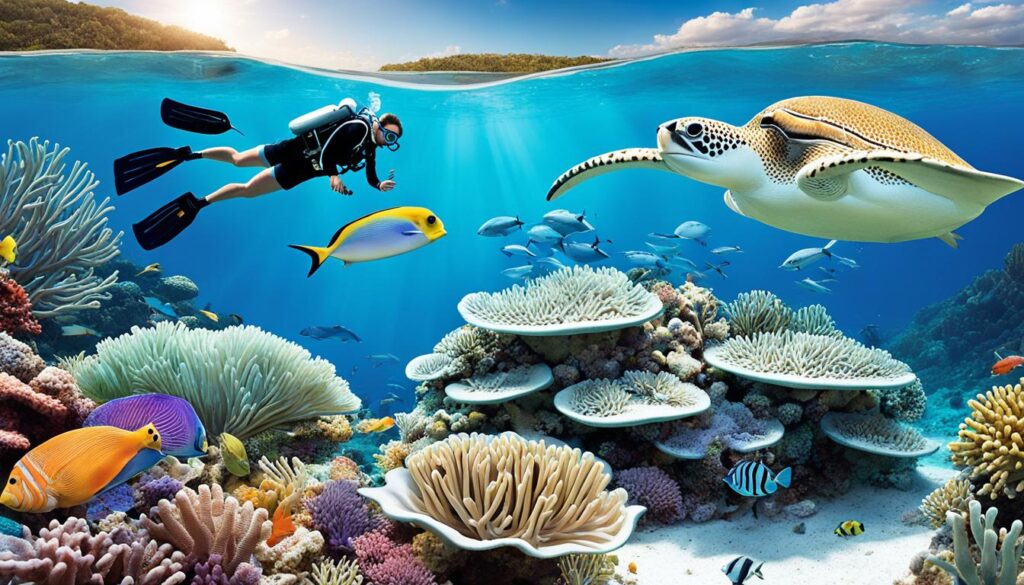The Great Barrier Reef, the world’s largest coral reef system, is a natural laboratory for marine biology PhD students. This UNESCO World Heritage site covers an area larger than the United Kingdom, serving as a global hotspot for biodiversity and a critical indicator of the health of our oceans. James Cook University, situated at the heart of this remarkable ecosystem, offers an unparalleled opportunity for aspiring marine biologists to pursue cutting-edge research and make a lasting impact on our understanding of coral reef ecosystems, marine conservation, and the effects of climate change.
Key Takeaways
- The Great Barrier Reef is the world’s largest coral reef system, covering an area larger than the United Kingdom.
- James Cook University, located at the heart of the Great Barrier Reef, offers exceptional PhD programs in marine biology and oceanography.
- Students can conduct research on coral reef ecology, marine conservation, and the impacts of climate change on tropical marine ecosystems.
- The university’s world-class facilities, including the Orpheus Island Research Station, provide unrivaled access to diverse marine environments.
- Collaborative partnerships with the Great Barrier Reef Marine Park Authority and local communities offer unique opportunities for interdisciplinary research and conservation efforts.
Overview of the Great Barrier Reef
Situated off the northeast coast of Australia, the Great Barrier Reef is a marvel of nature, boasting the title of the world’s largest coral reef system. Spanning over 2,300 kilometers (1,400 miles) and encompassing more than 2,900 individual reefs and 900 islands, this diverse marine environment is a global center of marine biodiversity.
World’s Largest Coral Reef System
The Great Barrier Reef is a vast and complex ecosystem that supports an extraordinary diversity of marine life. Home to over 1,500 species of fish, 200 species of birds, and numerous species of turtles, whales, and dugongs, this remarkable natural wonder is a testament to the richness of the ocean’s tropical marine environments.
Diverse Marine Ecosystems
Beyond its status as the world’s largest coral reef system, the Great Barrier Reef is renowned for its diverse array of marine ecosystems, including coral reefs, seagrass beds, mangrove forests, and open ocean habitats. These interconnected systems provide critical habitats for a wide range of marine organisms, making the Great Barrier Reef a true global hotspot for marine biodiversity.
Importance of Marine Biology Research
The Great Barrier Reef, the world’s largest coral reef system, is a vital area for marine biology research. Scientists are working tirelessly to understand the complex interactions within marine ecosystems and develop strategies for conservation and sustainable management. Through in-depth studies of coral reef ecology, marine species, and the impacts of climate change, researchers are gaining crucial insights that inform global efforts to protect and preserve these precious natural resources.
Understanding Marine Ecosystems
By partnering with organizations like the Great Barrier Reef Marine Park Authority, marine biologists are actively engaged in studying the intricate relationships between various marine organisms and their environment. This research not only enhances our understanding of the reef’s fragile ecosystem but also helps identify the most effective conservation and management practices to ensure its long-term sustainability.
Conservation and Management
The insights gained from marine biology research are instrumental in developing and implementing effective conservation and management plans for the Great Barrier Reef and other marine habitats. By understanding the complex interplay of factors, such as the impacts of climate change, researchers can work with policymakers and stakeholders to devise holistic strategies that address the multifaceted challenges facing our marine environments.

James Cook University’s Marine Science Programs
Situated in the heart of the Great Barrier Reef, Australia, James Cook University (JCU) is renowned for its exceptional marine science programs. Students at JCU have the unique opportunity to immerse themselves in the study of marine biology and aquaculture, taking advantage of the university’s proximity to one of the world’s most diverse and captivating marine ecosystems.
Marine Biology and Aquaculture Degrees
JCU’s marine science offerings include comprehensive degree programs in marine biology, aquaculture, and related disciplines. These programs provide students with hands-on experience and specialized training, equipping them to become leaders in fields such as marine conservation, sustainable aquaculture, and environmental management. With access to world-class research facilities and field sites, including the Great Barrier Reef, JCU’s marine science students gain a deep understanding of the complexities and importance of marine ecosystems.
Whether students aspire to contribute to the protection and restoration of the Great Barrier Reef or explore the promising field of aquaculture, JCU’s marine science programs offer an unparalleled opportunity to develop the skills and knowledge needed to make a meaningful impact in these crucial areas. With a strong emphasis on hands-on learning and collaborative research, JCU’s marine science programs continue to produce graduates who are well-equipped to tackle the pressing challenges facing our oceans.
Australia: Marine biology PhD Great Barrier Reef Australia
Pursuing a marine biology PhD at James Cook University in Australia offers unparalleled access to the Great Barrier Reef, one of the most diverse and ecologically significant marine environments on the planet. This unique location allows students to immerse themselves in cutting-edge research, working alongside leading experts to explore coral reef ecosystems, marine conservation, and the impacts of climate change on tropical marine environments.
The Great Barrier Reef, a UNESCO World Heritage site, serves as a living laboratory for aspiring marine biologists and environmental scientists. Australia’s marine biology PhD programs provide students with opportunities to contribute to the understanding and preservation of this natural wonder, working on research projects that address the complex challenges facing this invaluable ecosystem.

By pursuing a marine biology PhD in Australia, students gain unparalleled access to state-of-the-art research facilities, cutting-edge technologies, and a wealth of field research opportunities. From studying coral reef ecology to investigating the impacts of climate change on environmental science australia, the possibilities for groundbreaking discoveries are endless.
Field Research Opportunities
As part of James Cook University’s renowned marine science programs, students are granted unparalleled access to the JCU Orpheus Island Research Station, a world-class facility nestled in the heart of the Great Barrier Reef. From this strategic location, aspiring marine biologists can immerse themselves in the exploration of diverse marine ecosystems, including coral reefs, tropical islands, and mangrove habitats.
Coral Reef, Island, and Mangrove Sites
The Great Barrier Reef field research opportunities allow students to conduct in-depth studies on coral reef ecology, observe the intricate dynamics of island ecosystems, and delve into the rich biodiversity of mangrove habitats. These hands-on experiences not only enhance their understanding of marine biology but also contribute to cutting-edge research projects that have a direct impact on the conservation and management of these precious environments.
JCU Orpheus Island Research Station
The JCU Orpheus Island Research Station serves as a hub for marine biology graduate programs, providing state-of-the-art facilities and equipment for students to hone their research skills. From this strategic vantage point, they can explore the wonders of the Great Barrier Reef, gaining invaluable insights into the complex interactions within these island ecosystems and their critical role in the overall health of the marine environment.
Collaborative Partnerships
James Cook University’s marine science programs thrive on the university’s strong collaborative partnerships with key organizations, including the Great Barrier Reef Marine Park Authority. This government agency is responsible for the long-term health and management of the iconic Great Barrier Reef, one of the world’s most valuable marine ecosystems. By working closely with the marine park authority, JCU researchers gain invaluable insights and support for their great barrier reef conservation efforts.
Engaging Traditional Owners and Local Communities
In addition to partnering with the marine park authority, JCU also collaborates extensively with Traditional Owners and local communities surrounding the Great Barrier Reef. This indigenous partnerships approach allows the university to incorporate traditional ecological knowledge and support community-based research initiatives. By fostering these meaningful relationships, JCU ensures a holistic and inclusive approach to marine research and protection, benefiting both the environment and the people who rely on it.

Through these collaborative partnerships, JCU’s marine science programs are able to tackle the complex challenges facing the Great Barrier Reef, leveraging the expertise and resources of key stakeholders to drive impactful marine park authority initiatives and safeguard this natural wonder for generations to come.
Research Focus Areas
At James Cook University, marine biology PhD students have the opportunity to delve into crucial research areas that contribute to the understanding and preservation of our oceans. Two of the primary focus areas are coral reef ecology and marine conservation.
Coral Reef Ecology
Coral reefs are incredibly diverse and complex marine ecosystems, and studying their ecology is crucial for understanding the effects of climate change and developing sustainable management strategies. PhD students in the coral reef ecology research track investigate the intricate relationships between corals, other marine life, and the surrounding environment. By analyzing the impact of factors such as rising temperatures, ocean acidification, and human activities, these researchers provide valuable insights that inform global efforts to protect and restore coral reefs.
Marine Conservation
In the face of mounting threats to marine environments, including overfishing, habitat destruction, and the effects of climate change, the need for effective conservation strategies has never been more pressing. PhD students in the marine conservation science track focus on developing innovative approaches to safeguard the health and resilience of marine ecosystems. Their research explores sustainable resource management, the impacts of human activities on marine life, and the implementation of conservation policies that balance the needs of both the environment and local communities.
By delving into these critical research areas, marine biology PhD students at James Cook University contribute to the global effort to protect and sustain our planet’s precious marine resources.
Cutting-Edge Facilities and Technology
James Cook University’s marine science programs are supported by state-of-the-art facilities and cutting-edge research technology, enabling students to engage in data-driven ocean exploration and contribute to the advancement of marine science. From specialized laboratories and field stations to the latest analytical tools and remote sensing equipment, JCU provides its students with the resources and infrastructure necessary to conduct groundbreaking research in the Great Barrier Reef and beyond.
The university’s marine science research facilities, such as the Orpheus Island Research Station, are equipped with advanced technologies that facilitate technology-enabled research and data-driven ocean exploration. Students have access to a wide range of equipment, including remote sensing devices, underwater remotely operated vehicles (ROVs), and high-resolution imaging systems, which allow them to collect and analyze vast amounts of marine data.
This commitment to providing world-class infrastructure and technology-enabled research opportunities is a key aspect of JCU’s marine science programs. By leveraging the latest advancements in fields like oceanography, marine biology, and environmental science, students can contribute to the understanding and conservation of the Great Barrier Reef and other critical marine ecosystems.
Through hands-on experience with cutting-edge research tools and facilities, JCU’s marine science students gain the skills and knowledge necessary to pursue careers in a variety of fields, from marine conservation and resource management to scientific research and education.
Career Opportunities
Graduates of James Cook University’s renowned marine science programs are well-positioned to pursue a diverse array of career paths that allow them to apply their expertise in marine biology, conservation, and environmental research. From serving as marine conservation officers to becoming marine scientists and biologists, these professionals play a vital role in protecting and managing our precious ocean resources.
Marine Conservation Officers
Marine conservation officers are responsible for enforcing regulations and policies aimed at safeguarding marine ecosystems, such as the Great Barrier Reef. They work closely with government agencies, non-profit organizations, and local communities to monitor and respond to environmental threats, implement conservation strategies, and promote sustainable resource use.
Marine Scientists and Biologists
Marine scientists and biologists conduct cutting-edge research to deepen our understanding of marine habitats, species, and ecological processes. They may specialize in areas like coral reef ecology, marine wildlife biology, or ocean acidification, contributing to the global effort to conserve and restore the health of our oceans.
Educators and Environmental Managers
Graduates also find fulfilling careers as educators, leading outreach and environmental education programs that inspire the next generation to become stewards of the marine environment. Others transition into roles as environmental managers, using their expertise to develop and implement policies and strategies for sustainable coastal and marine resource management.

International Collaboration and Impact
At James Cook University, the marine science programs foster a vibrant culture of global collaboration, empowering students to engage with researchers and institutions worldwide. By participating in the global marine research network, marine biology PhD students contribute to the worldwide effort to understand and safeguard the health of our planet’s precious marine ecosystems.
Through international partnerships and cross-cultural collaboration, these students generate groundbreaking insights and innovations that have a lasting impact on the future of our oceans. Their work not only advances the field of marine science but also promotes sustainable practices and conservation efforts that benefit communities around the globe.
The university’s commitment to collaborative research extends beyond academic boundaries, forging meaningful connections with traditional owners and local communities. This holistic approach ensures that the marine science impact extends far beyond the confines of the laboratory, positively influencing policy, education, and environmental management on an international scale.
By bridging diverse perspectives and leveraging the expertise of global partners, James Cook University’s marine science programs are driving transformative change in the way we understand and protect our precious marine resources. The lasting legacy of this international collaboration is a testament to the power of collective action in addressing the critical challenges facing our oceans.
Conclusion
The Great Barrier Reef in Australia offers an unparalleled opportunity for marine biology PhD students to engage in cutting-edge research and contribute to the global effort to protect and sustain the world’s precious marine resources. By pursuing a doctoral degree at James Cook University, students gain access to state-of-the-art facilities, diverse field research sites, and collaborative partnerships that prepare them for rewarding careers in marine conservation, scientific research, and environmental education and management.
Whether studying the intricate ecology of coral reefs, investigating innovative approaches to marine conservation, or exploring the dynamic relationships between marine ecosystems and local communities, students at James Cook University are empowered to make a tangible impact on the future of the Great Barrier Reef and other vital marine habitats around the world. The university’s commitment to excellence, innovation, and sustainability ensures that these future leaders in marine science are equipped with the knowledge, skills, and resources necessary to drive meaningful change in the field of marine biology.
As the world continues to grapple with the challenges of climate change, habitat degradation, and the growing need for sustainable resource management, the marine biology PhD program at James Cook University stands as a beacon of hope, equipping the next generation of scientists, conservationists, and policymakers with the tools and expertise to safeguard the health and resilience of our ocean ecosystems. By choosing to pursue their doctoral studies in this unique and remarkable setting, students embark on a journey that will not only transform their own lives but also contribute to the broader mission of preserving the wonders of the Great Barrier Reef for generations to come.
Source Links
- Home Page – GBR Biology – https://www.gbrbiology.com/
- Australia: Great Barrier Reef – https://miamioh.edu/cas/graduate-studies/project-dragonfly/earth-expeditions/courses-landing-pages/australia.html
- Marine Science – https://www.jcu.edu.au/courses/study/marine-science


